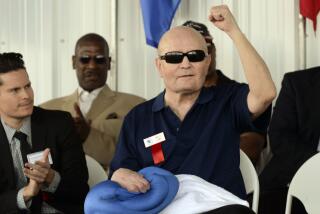THE EARP DECISION <i> by Jack DeMattos (Creative Publishing Co., Box 9292, College Station, Tx. 77842: $21.95; 206 pp.) </i>
- Share via
Wyatt Earp, the legendary gunslinger whom readers of Western history have grown to love or hate, was not known in his lifetime for the famous shoot-out at the OK Corral, writes Jack DeMattos. That piece of mythologizing only occurred two years after his death in 1929, when Stuart N. Lake published “Wyatt Earp: Frontier Marshal.” In his lifetime, Earp did become a household word, but he did so because of a controversy over his decision as referee of a world heavyweight title fight. “The Earp Decision” chronicles this colorful episode in Western history through contemporary newspaper accounts.
On Dec. 2, 1896, boxers Robert Fitzsimmons and Tom Sharkey met in Mechanics’ Auditorium in San Francisco. Sharkey won the fight--and the $10,000 purse--on a foul called against Fitzsimmons in the eighth round. Fitzsimmons called the decision “bare-faced robbery”; Sharkey, on the other hand, had to be carried out of the ring, but “did not act like a man who had been knocked out by a blow above the belt.” Earp, the referee chosen by the National Athletic Club when the contestants had been unable to agree on a referee, had been relieved of a Colt .45 before the fight began. He was arrested afterwards for carrying a concealed weapon into the ring, and it was suggested that he had been paid to throw the fight to Sharkey. A raging public battle ensued, in which reporters and cartoonists from the three San Francisco papers took active part.
Not the least interesting aspect of this very entertaining book is the description of the black-sheep nature of the boxer’s sport. Even with the title of World Heavyweight Champion at stake, finding a place for a fight was an obstacle. When boxing promoter Dan Stuart announced the mounting of a fight in Texas, state governor Charles Culbertson “had his state legislature rush through a bill which prohibited prizefighting.” When the mayor of Hot Springs, Ark., offered his town, the Arkansas governor promised not to imitate neighboring Texas; instead, he had the fighters arrested at the border, citing “conspiracy to commit assault.” That particular fight finally took place on a sand bar in the Rio Grande, where “neither the Texans nor the Mexicans could claim jurisdiction” to stop the fight.
As a portrait of late 19th-Century America and as a contribution to the debunking of Wyatt Earp, “The Earp Decision,” with its delicious footnotes, will give pleasure to Western-history buffs.
More to Read
Go beyond the scoreboard
Get the latest on L.A.'s teams in the daily Sports Report newsletter.
You may occasionally receive promotional content from the Los Angeles Times.










